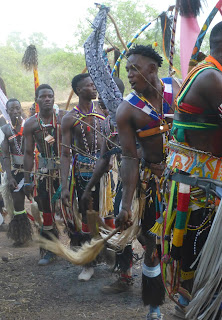Not fully satisfied with a life spent drinking wine or coffee with friends in local cafes/restaurants with occasional days working on the To Do List, I was pleased to discover that the initiation ceremonies of the adolesecent boys of the Bassari tribe were taking place this month. A real trek to get to the small town of Salemata (40 minutes in a shared transit van; 20 minutes pushing my way through an overcrowded street market; 2 hours in a 'waiting room'; 14 hours in an overnight bus with continuous music and quite a few stops including police checks of our ID; quick taxi ride to the shared taxi station where there is only a 30 minute wait until there are seven of us; 90-minute drive in the seven-place taxi; 30-minute wait with a log to sit on thanks to a kind family; 10 minutes on the back of a motorbike taxi to my very basic accommodation), and then a 4km walk on dirt tracks (including one very steep hill) in 42C heat each day to get to the small village of Egath where the initiation was taking place ... but definitely worth the effort.
The first day involved a lot of dancing by a big group of young men in traditional colourful outfits (performing the Yanguët dance), whilst those a couple of years younger, in the (to me) bizarre 'traditional' attire of football kits, had their hair braided before doing a dance performance of their own around the village. It was noisy (whoops, whistles and a traditional wooden flute), colourful, and plenty of honey wine, palm wine and millet beer was consumed. I was the only tourist there.The next morning I got up very early so as to depart Salemata at 6am and avoid the worst of the heat for the walk there - but also to be sure to catch all of the action on this the main day of the initiation. Or at least most of the action, as the physical combat between the initiates and their older initiated opponents is off-limits to female spectators, unfortunately. But for me, again, the main attraction was the colour and spectacle of the dancers - who first appeared out of the trees on a distant hillside, making a sound I cannot describe, so as to remind the boys of what was to come.
Whether these (the Odkwëta od Khëmër masks) were the same guys who had danced the previous day I cannot say, as they remained masked all day apart from during the combat which I couldn't watch. There were dozens of them, who came slowly down the hill towards the village behind a guy in a different mask - the 'grandfather' of the troupe I think someone called that mask. Pretty much like the dancers of the previous day, they performed a kind of foot-stomping dance to the accompaniment of flute, whistles and the strange sounds they made themselves.
Meanwhile, the family of each of the 42 initiates slit the throat of a male goat they had brought, as a sacrifice, and cut it into appropriate pieces, after which the boys went off to take part in the combat and the men to watch. While that was going on, the women prepared lunch - goat meat, of course.
During the afternoon there was a further sacrifice, this time of cockerels, with the feathers then woven into the hair of the now shirtless young initiates to show that they had completed the combat. Suitably adorned, the boys paraded around the village, where they were presented with big blocks of a kind of cake made with sugar and peanut butter - and of course more alcohol, which had been again available all day. They were also given gifts - banknotes attached to their hair with safety pins, and long bolts of fabric draped over their arms.
After a long break (to allow time for the consumption of more goat meat and more alcohol), the dancers returned, this time accompanied by drummers, to begin a long night of continuous celebration. By this time though the heat, the alcohol and the lack of sleep had got to me, so I made my way back to Salemata for a short night's sleep before beginning the long trek back to Dakar.
As this initiation process takes place for three weekends in a row in three different villages in the region, I suppose if I had planned it better I could have stayed on, spent the intervening week hiking in the hills looking for birds and chimpanzees before watching the whole thing all over again in a different village (apparently the one taking place in Ethiolo this weekend will be bigger), but in any case I am really glad to have had the opportunity to see this - reminding myself that people in much of the world are going through all of the challenges related to the COVID pandemic whilst I was in what seemed like a different universe.
Lucky me!








No comments:
Post a Comment